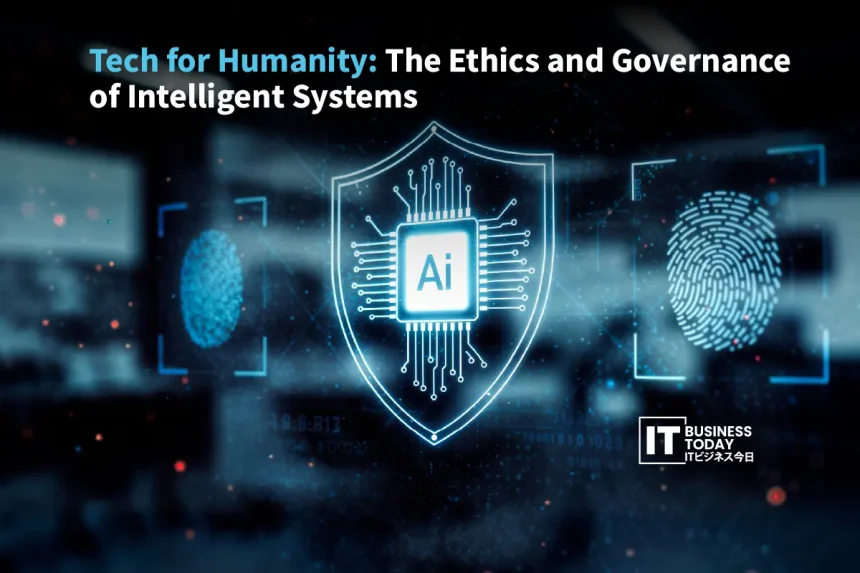AI is everywhere now. The focus is shifting. It used to be about what AI can do. Now it is about what AI should do. Efficiency alone is no longer enough. AI is becoming a co-pilot in human decision-making. That makes every choice it touches more important.
Responsible AI, or RAI, is no longer optional. Ethics in AI is a business issue. Companies, by the use of AI, can suffer from bad reputation, loss of customer trust, and even decreased sales if the technology fails or acts in a partial manner. The three tools, namely governance, supervision, and ethical frameworks, can be applied to handle those risks. They provide the following: fairness, openness, and security.
The big idea is simple. Effective AI governance is the bridge. Organizations can harness the power of AI while still having human control. It also ensures that the AI’s decisions, if they are to be fast or clever, are still accountable and in line with human values. The situation would be too risky without it.
Also Read: Inside Japan’s Adtech Transformation: How Adaptive Streaming Is Solving the Performance vs. Experience Paradox
The Core Ethical Imperatives for Intelligent Systems

AI isn’t just about smart algorithms or fast computations. It’s about people, society, and the ripple effects decisions create. Take bias for instance. It doesn’t always wear a mask. Sometimes it’s hidden in data, sometimes in the way systems are built. Hiring tools that reject resumes based on patterns in past decisions, lending models that deny loans disproportionately, or predictive policing tools reinforcing old inequities are real consequences. The change is now not limited to precision alone, it is also about justice, and this entails deliberate work in each and every step of the design process.
When AI operates like a black box, trust is shattered. If a system spits out a verdict without explanation, people will push back. That’s why explainable AI matters. Regulators are demanding clarity. Developers need to show not just what a model predicts but why it does so. Microsoft’s 2025 Responsible AI Transparency Report highlights 30 tools with over 155 features aimed at helping developers build responsibly. That is the direction the industry is moving in.
Then comes accountability. Who answers when an autonomous system goes off track, developers, deployers, or the users themselves? Human oversight isn’t optional anymore. Concepts like human in the loop versus human on the loop make a difference. OpenAI’s report since February 2024 shows they disrupted over 40 malicious networks exploiting their API for scams, cyber operations, and influence campaigns. That is hands-on vigilance, not theory.
These imperatives, fairness, transparency, and accountability, aren’t just buzzwords. They are the foundation for AI that doesn’t just perform but earns trust. Getting this wrong isn’t an option anymore because AI decisions shape lives, reputations, and futures in ways we cannot ignore.
The Global Regulatory Landscape from Principles to Law
AI is everywhere now and rules are trying to catch up. The European Union is at the front with the AI Act. People call it the global standard. The EU sorts AI by risk. Some systems are just not allowed. Social scoring tools for example, they are banned. High-risk systems, such as those in healthcare or hiring, demand very thorough verification. Everything including documentation, testing, human supervision, must be present. Then there is limited-risk AI. These systems just have to tell users they are talking to AI or using AI.
For businesses outside Europe, this matters a lot. They often follow the same rules just to sell in the EU. This is called the Brussels Effect. If you want access to that market, you have to comply. The rollout is happening in phases. Deadlines are coming. Companies can’t ignore them.
In the United States, it is different. There are no hard bans like in Europe. The focus is on managing risk. NIST has a framework called the AI Risk Management Framework. It is voluntary. It helps companies figure out risks, how to deal with them, and how to keep AI safe. The framework is flexible. Small startups and big companies can adapt it to their needs. It is not law, but it sets a clear expectation.
Around the world, other groups are also setting principles. The OECD has AI Principles. UNESCO has a Global Recommendation on AI Ethics. Both talk about the same things. AI should not harm people. Human decisions should stay central. Even though countries have different rules, they are agreeing on basic values.
Knowing these rules is not optional anymore. Companies that ignore them risk penalties. Companies that follow them build trust. In an AI-driven world, trust matters as much as compliance.
Turning Ethics into Business Value Through Governance

Ethics in AI is not just a nice idea. It can actually make or break business value. Companies that ignore it often pay in trust, talent, and money. The first step is setting up an internal AI governance structure. Many are creating a Responsible AI Office or Committee. You need clear roles. A Chief AI Ethics Officer to lead, data stewards to manage and protect data, and model auditors to check that AI behaves as expected. Without these roles, ethics stays theoretical, and problems slip through.
Next is embedding ethics into the AI development lifecycle. Ethics can’t be an afterthought. It needs to be part of design. Teams need to audit models during design, govern data carefully, and monitor models while they run. Stress-testing is critical. Red teaming, where you simulate attacks and misuse, shows where models can fail. Google’s 2024 Responsible AI Progress Report highlights this. They do multi-layered red teaming, internal and external, to catch safety, security, and bias issues before deployment. That’s the kind of practice that saves real headaches later.
Trust also becomes a competitive asset when ethics is operationalized. Customers notice, employees notice, and regulators notice. Ethical practices help build loyalty, attract top talent, and reduce friction with regulators. Breaches involving shadow AI cost an average of US$ 670,000 more than other breaches. The numbers are clear. And it’s not just defensive. The 2025 U.S. Responsible AI Survey shows 58% of companies say their Responsible AI work improves ROI and operational efficiency. Doing ethics right can directly improve the bottom line.
Governance makes ethics actionable. It turns principles into decisions, checks, and accountability. It keeps AI safe, fair, and transparent. And in the process, it builds trust that pays off. Companies that treat ethical AI as a core part of operations are not just avoiding risks, they are creating a measurable business advantage.
End Note
AI is moving fast. Rules are trying to catch up but often they lag. The main idea is simple. Governance is the bridge between innovation and human values. You cannot set it up once and forget it. It has to be ongoing. Every model, every deployment, every decision needs attention. Ethics and governance go together. They make AI something people can actually trust.
The next set of challenges is already appearing. Agentic AI is coming, systems that act more independently. Who is responsible when they make a mistake? Deepfakes and fake media are spreading. They can destroy trust in information. Sharing data internationally is gaining a lot of importance, but it’s a complicated process. To overcome the problem, the collaboration of companies and governments will be necessary. They shall form rules and agreements that ensure AI is safe, fair, and responsible. Nevertheless, the progress in technology must not be interrupted at the same time.
Business leaders cannot wait for regulations. They have to act first. Responsible AI frameworks need to be adopted before problems show up. Setting up governance, auditing models, testing AI under stress, and embedding ethics are not just boxes to check. They actually shape the future. Leaders who do this earn trust. They attract good talent. They turn ethics into an advantage for their business.
AI will touch everything. The way we handle it today will determine the kind of world we inhabit tomorrow. Organizations can either wait for regulations and respond subsequently or take charge and guide the way. The values of strong governance and ethical practices are the only means by which AI can create value and yet still be human values compliant.







